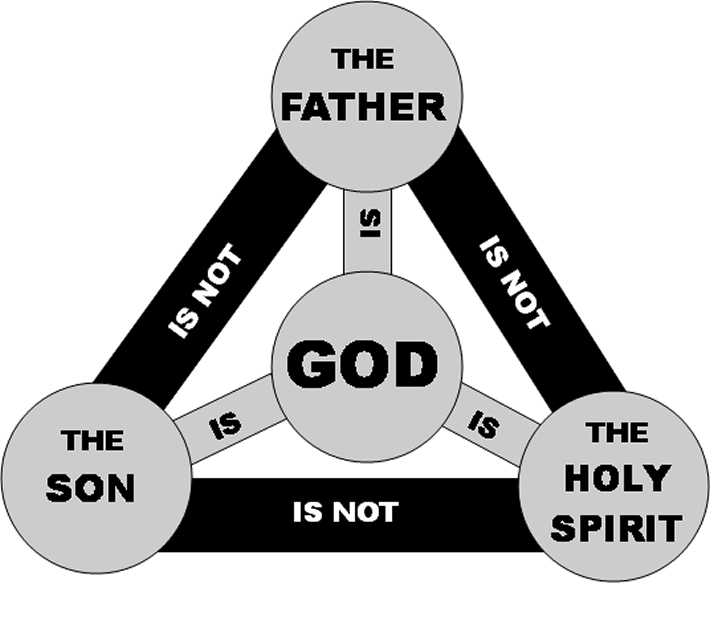Our Beliefs: God

God
There is only one true and living God. (Deuteronomy 6:4; Isaiah 45:5-7; 1 Corinthians 8:4)
God is perfect. (Deuteronomy 32:4, Mark 10:18)
God is the creator of all things. (Genesis 1:1-31; Ephesians 3:9)
God is sovereign; is the supreme authority and all things are completely under His control. He has the absolute right and full authority to do exactly as He pleases. (Psalm 115:3; 2 Chronicles 20:6; Isaiah 46:10)
God eternally exists as three persons, one in essence, each fully God, Father, Son and Holy Spirit, each equally deserving worship and obedience. (Genesis 1:26, Matthew 28:19, 2 Corinthians 13:14)
God the Father
God the Father is:
Eternal – Isaiah 40:28
Omnipresent (present everywhere at the same time) – Jeremiah 23:23-24
Omnipotent (all-powerful) – Job 42:2
Omniscient (all-knowing) – Psalm 147:5
God as Creator is Father to all mankind (Ephesians 4:6) but He is only a spiritual Father to believers. (Romans 8:14; 2 Corinthians 6:18)
God saves from sin all those that come to Him through Jesus Christ and through adoption He becomes Father to His own. (John 3:16; John 1:12; Romans 8:15; Galatians 4:5; Hebrews 12:5-9)
God as Creator is Father to all mankind (Ephesians 4:6) but He is only a spiritual Father to believers. (Romans 8:14; 2 Corinthians 6:18)
God saves from sin all those that come to Him through Jesus Christ and through adoption He becomes Father to His own. (John 3:16; John 1:12; Romans 8:15; Galatians 4:5; Hebrews 12:5-9)
God the Son
God the Son is:
Eternal – John 8:58
Omnipresent (present everywhere at the same time) – Matthew 18:20
Omnipotent (all-powerful) – Philippians 3:20-21
Omniscient (all-knowing) – John 21:17
Jesus Christ is the Son of God. (Luke3:38; John 1:49)
God the Father is Creator of all things through His Son, Jesus Christ, who also sustains, holds all things together through Him (His Son). (John 1:3; Colossians 1:15-17; Hebrews 1:2)
Jesus Christ is co-equal and of the same substance and essence of God the Father. (John 10:30; John 14:9; Matthew 11:27)
We believe in the incarnation (God becoming man). God the Son surrendered all His rights of deity but nothing of His divine essence and became the God-man. (Philippians 2:5-8; Colossians 2:9; John 1:14; Galatians 4:4)
We believe in the complete deity and humanity of Jesus Christ. (Isaiah 9:6; Hebrews 4:14)
We believe that Jesus Christ was conceived by the Holy Spirit, born of the virgin Mary. (Isaiah 7:14; Luke 1:26-35; Matthew 1:23)
The purpose of the incarnation (God becoming man) was to reveal God, redeem men and rule over God’s kingdom. (Psalm 2:7-9; Isaiah 9:6; John 1:29; Philippians 2:9-11; Hebrews 7:25-26; 1 Peter 1:18-19)
Jesus Christ accomplished our redemption through the shedding of His blood and sacrificial death on the cross. His death was voluntary, done on our behalf (vicarious), substitutionary (He died in our place) and it satisfied God’s anger (propitiatory). (John 10:15; Romans 3:24-25; Romans 5:8; 1 Peter 2:24)
We believe that because of what Christ did for us on the cross, a believing sinner is freed from the punishment of sin, the penalty, the power and one day the presence of sin; and he is declared righteous, given eternal life and adopted into the family of God. (Romans 3:25; Romans 5:8-9; 2 Corinthians 5:14-15; 1 Peter 2:24; 1 Peter 3:18; Ephesians 1:5)
We believe that our justification (being declared ‘not guilty’ before God) is made sure by the resurrection of Jesus Christ from the dead and that Jesus ascended to the right hand of the Father, where he now mediates as our advocate and High Priest. (Matthew 28:6; Luke 24:38-39; Acts 2:30-31; Romans 4:25; Romans 8:34; Hebrews 7:25; Hebrews 9:24; 1 John 2:1)
We believe that God confirms the deity of His Son and accepts the atoning (making amends for sin) work of Christ on the cross because of the resurrection of Jesus Christ from the grave. The bodily resurrection of Jesus is also the guarantee of a future resurrection life for all. (John 5:26-29; John 14:19; Romans 1:4; Romans 4:25; Romans 6:5-10; 1 Corinthians 15:20; 1 Corinthians 15:23)
We believe that Jesus Christ will return to receive, to himself, at the rapture, the church, which is His body. He then will return with His church in glory to establish His thousand-year kingdom on earth. (Acts 1:9-11; 1 Thessalonians 4:13-18; Revelation 20)
The Lord Jesus Christ is the One through whom God will judge all mankind. John 5:22-23)
- Believers (1 Corinthians 3:10-15; 2 Corinthians 5:10)
- Living inhabitants of the earth at His glorious return (Matthew 25:31-46)
- Unbelieving dead at the ‘great white throne’ (Revelation 20:11-15)
As the mediator between God and man (1 Timothy 2:5), the Head of His Body the church (Ephesians 1:22; Ephesians 5:23; Colossians 1:18), and the coming universal King, who will reign on the throne of David (Isaiah 9:6; Luke 1:31-33), He (Jesus Christ) is the final Judge of all who fail to place their trust in Him as Lord and Saviour (Matthew 25:14-46; Acts 17:30-31)
God the Holy Spirit
God the Holy Spirit is:
Eternal – Hebrews 9:14
Omnipresent (present everywhere at the same time) – Psalm 139:7-12
Omnipotent (all-powerful) – Luke 1:35
Omniscient (all-knowing) – Isaiah 40:13-14
The Holy Spirit is a person:
- He has a mind – Romans 8:27
- He has knowledge – 1 Corinthians 2:11
- He possesses affection – Romans 15:30
- He has a will – 1 Corinthians 12:11
- Jesus consistently refers to the Holy Spirit as a person – John 14:16-17
- He speaks – Acts 10:19-20; Acts 13:1-4; 1 Timothy 4:1
- He teaches – John 14:26
- He bears witness – John 15:26-27
- He forbids – Acts 16:6-7
- He can be grieved – Ephesians 4:30
- He can be blasphemed – Matthew 12:31-32
- He can be insulted – Hebrews 10:29
- He can be lied to – Acts 5:3
- He can be resisted – Acts 7:51
It is the work of the Holy Spirit to carry out the divine will with relation to all mankind. His work includes:
- Creation – Genesis 1:2
- The incarnation (God becoming human) – Matthew 1:18
- The written Word of God – 2 Peter 1:20-21
- The work of salvation – John 3:5-7
We believe that the work of the Holy Spirit in this age began at Pentecost, when He came from the Father as promised by Christ (John 14:16-17; John 15:26) to initiate and complete the building of the Body of Christ, which is His church (1 Corinthians 12:13).
Further activity or work of the Holy spirit includes:
- Convicting the world of sin, righteousness and of Judgement – John 16:7-9
- Glorifying the Lord Jesus – John 16:14
- Baptizing believers into the Body of Christ – 1 Corinthians 12:13
- Transforming believers into the image of Christ – Romans 8:29; 2 Corinthians 13:18
- He guides us into all truth – John 16:13
All believers receive the indwelling Holy Spirit on regeneration, when they are ‘born again’. (John 3:5-7; Romans 8:9)
Although believers receive the indwelling Holy Spirit on regeneration, they still need an infilling or ‘baptism in the Holy Spirit’. (Matthew 3:11; Acts 1:8; Acts 2:1-4; Acts 8:14-16; Acts 9:17; Acts 10:44-46; Acts 19:6)
There will be evidence of the infilling or baptism in the Holy Spirit, which may or may not include the speaking in tongues as indicated in the book of Acts. (Acts 2:1-4; Acts 8:8; Acts 9:17 (Paul subsequently spoke in tongues – see 1 Corinthians 14:18); Acts 10:44-46; Acts 19:6)
Further ongoing evidence of the presence of the Holy Spirit will the outworking of the fruit of the Holy Spirit which is: Love, joy, peace, patience, kindness, goodness, faithfulness, gentleness and self-control. (Galatians 5:22-23).
There is a requirement for believers to continually be being filled with the Holy Spirit. (Ephesians 5:18; Acts 4:8; Acts 4:31; Acts 7:55; Acts 13:9; Acts 13:52)
The Holy Spirit empowers the believers for witnessing and ministry, distributing gifts to the Body of Christ, the church. (Acts 1:8; 1 Corinthians 12:4-11; Ephesians 4:7-12)
We believe that all the gifts of the Holy Spirit are still available today and will be until ‘perfection comes’. (1 Corinthians 13:10)
